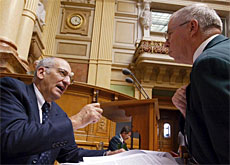
Rifts appear in power-sharing government

Swiss President Joseph Deiss has rebuked the interior minister, Pascal Couchepin, for publicly attacking a cabinet colleague.
Couchepin broke cabinet ranks on Sunday, branding Justice Minister Christoph Blocher – a member of the rightwing Swiss People’s Party – a danger to democracy.
A public spat between members of the country’s seven-strong cabinet is practically unheard of in Switzerland, where disputes normally take place behind closed doors.
Under the principle of “collegiality”, it is frowned upon for the cabinet – which is made up of members from Switzerland’s four main parties – to wash its dirty laundry in public.
“It is not appropriate for cabinet members to get involved in public disputes,” said Deiss on Monday.
Deiss said he regretted the fact that a debate about the limits of direct democracy had been launched via the media and at an “inopportune moment”.
According to media specialist Roger Blum, the interior minister’s public attack against a colleague shows that something is wrong within the government.
“Blocher wants first and foremost to implement his party’s policies,” Blum told the “Basler Zeitung” on Monday.
“The fact that a cabinet minister is acting like a party leader is unheard of,” added the Bern University professor, who believes Blocher is abusing his position.
According to Blum, the justice minister is attempting to change the cabinet into a sort of mini-parliament where everybody sticks to their guns.
“It doesn’t fit with our idea of a consensus government,” he said.
Failure to perform
Couchepin, a member of the centre-right Radical Party, criticised Blocher in the Sunday press for his failure to support government-backed proposals to ease citizenship rules for young foreigners.
The Swiss rejected the proposals in a nationwide vote on September 26.
The interior minister said he believed Blocher’s behaviour was “dangerous for Swiss democracy”, adding that the justice minister was wrong to say the government had to accept voter decisions and keep quiet.
In a statement released on Tuesday, Blocher said he welcomed a debate about Swiss democracy and called for a “clear and transparent definition of the roles of parliament and government as representatives of the people”.
Constitution
“The people cannot be a dictator,” said Couchepin. “The constitution says that power is split between the people and the country’s institutions.”
Couchepin also attacked Blocher’s party, which came in for strong criticism in the run-up to the vote.
“They treat people as a herd that can be led around by the nose,” he said.
Inflammatory campaigning linked to the People’s Party included adverts predicting a dramatic rise in Switzerland’s Muslim population and a picture of a mocked-up Swiss identity card in the name of Osama bin Laden.
This provoked an unprecedented joint attack on the rightwing party by five rival parties.
Party support
Couchepin had some support from Radical Party ranks on Monday. Fulvio Pelli, head of the Radical faction in parliament, said everybody could see that consensus politics was in trouble.
Doris Leuthard, president of the centre-right Christian Democrats, added that the government had become a collection of individuals where everyone did as he or she pleased.
People’s Party president Ueli Maurer rejected Couchepin’s accusations, telling Swiss television that the People’s Party and Christoph Blocher put the highest value on democracy.
The interior minister’s outburst comes as the campaign to gain parliamentary and public support for a second series of bilateral accords with the European Union gets underway.
The cabinet has demanded that Blocher defend the Schengen/Dublin accord, which governs closer cooperation on security and asylum.
While the justice minister has promised to do his job, Maurer doubts that anyone will take his words at face value.
“All of Switzerland knows Mr Blocher is opposed to Schengen and Dublin, and that’s not going to change any time soon,” he told the “SonntagsZeitung”.
The People’s Party president added that the cabinet would lose credibility by forcing the justice minister to toe the line.
swissinfo with agencies
Pascal Couchepin’s remarks came after days of criticism of Blocher by the media.
But the justice minister is not the only one who has been disturbing the cabinet’s peace recently.
During the summer, Couchepin criticised the foreign ministry for taking on cultural tasks normally carried out by his department.
President Joseph Deiss and foreign minister Micheline Calmy-Rey have also contradicted each other over Switzerland’s role at the United Nations.

In compliance with the JTI standards
More: SWI swissinfo.ch certified by the Journalism Trust Initiative


























You can find an overview of ongoing debates with our journalists here . Please join us!
If you want to start a conversation about a topic raised in this article or want to report factual errors, email us at english@swissinfo.ch.